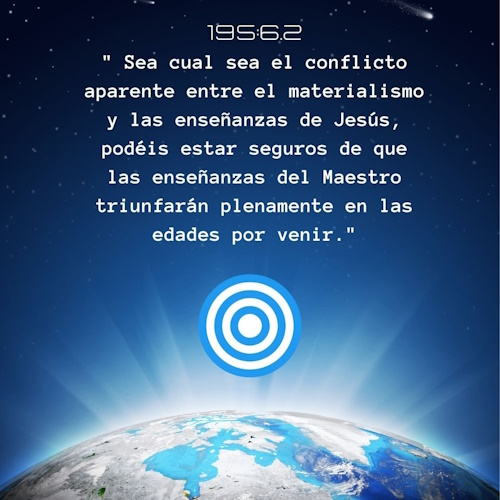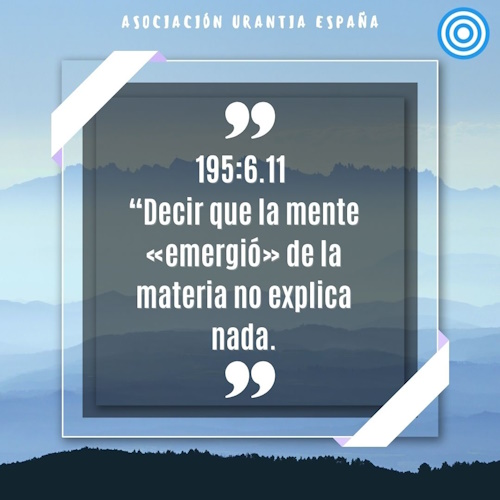© 2022 María José Sánchez Santamaría
© 2022 Urantia Association of Spain
| Luz y Vida — April 2022 — Newsletter | Luz y Vida — April 2022 — Index | Navigating Life – The Evolutionary Levels of Emotions |

Let’s start by telling an old story:
The monk asked:
“All these mountains and these rivers and the earth and the stars… where do they come from?”
And the Master asked: “And where does your question come from?”
Search within yourself!
This short story shows us a great truth: the perception of the divine is within everyone’s reach. So many people have experienced it in thousands of centuries, without the need for intermediaries, in different cultures, that it should make us reflect on our own approach to divinity. The transcendent experience is something that can be in our hands, yes, but that does not imply that the world encourages us to do so.
Hundreds of years ago, Agustín de Hipona told us these wonderful words that deserve to be reread several times:
“I loved you late, beauty so old, and so new, I loved you late. And behold, You were within me, and I was outside; and outside I was looking for you, and I threw myself on those beauties that you created.”
“You were with me, but I was not with you. They kept me away from you those things that, if they were not in you, would not exist.”
The Urantia Book also affirms this union of God with his creatures in the innermost of our minds:
ALTHOUGH the Universal Father is personally resident on Paradise, at the very center of the universes, he is also actually present on the worlds of space in the minds of his countless children of time, for he indwells them as the Mystery Monitors. The eternal Father is at one and the same time farthest removed from, and most intimately associated with, his planetary mortal sons. (UB 107:0.1)
But if we look at our current planetary civilization, does this connection (otherwise so desired by divinity) occur on a daily basis between us and our inner God?
Unfortunately materialism, secularism, scientism and a material and spiritual heritage that has advanced in fits and starts do not facilitate this desirable connection.
Nietzsche’s announcement of “God is dead” already showed us in the 19th century a gigantic dystopian wave originated and promoted by a deep and powerful current of materialism. It arose, among other factors and according to what The Urantia Book tells us, from a powerful reaction to the ecclesiastical and mental totalitarianism of the Church:
The mother of modern secularism was the medieval totalitarian Christian Church. Secularism began as a growing protest against the almost complete domination of Western civilization by the institutionalized Christian Church. UB 195:8.2
It took a great force, a powerful influence, to free the life and thought of the Western peoples from the stifling grip of a totalitarian ecclesiastical domination. Secularism broke the bonds of Church control and now in turn threatens to establish a new kind of godless rule in the heart and mind of modern man. The tyrannical and dictatorial political State is a direct offspring of scientific materialism and philosophical secularism. UB 195:8.4
Currently, a paradigm completely clinging to the material and the small self is imposed. A vision of life that rejects the transcendent and throws the human being into the arms of the superficial and evanescent prevails. And thus expelled Spirituality (with capital letters) from our lives and society, what remains?
We are left, according to Emilio Carrillo, “a uniformity disguised as theoretical personal options as vain as they are inconsistent; and a globalization that devastates the relevant principles and foundations and extends and establishes the false values of the herd… Human beings who fall into this senseless dynamic are little less than “suicides”, since, by “killing God”, they also "kill ” the divinity that they treasure in their Essence. That is to say, they “kill” their true being and their authentic nature”.
It is not surprising that this consideration of the human being has promoted extremes such as the currently in vogue ideology of transhumanism, a true anti-humanism. Transhumanists do not value the human being too highly. They consider that we do not have any essence: we are just the packaging, like the USB, of an information code that can finally be reduced to binary language. Computers are more reliable and can be made to last much longer than the human body (that dirty mass of pus, blood and guts).
Currently, the crown jewel of transhumanism is his idea of downloading human consciousness into a computer and allowing it to live forever or almost forever experiencing an artificial paradise of pure digital pleasure inside a silicon mount. Transhumanists seek to escape towards pure consciousness, but through matter itself, under the premise that neither the spirit nor a transcendent plane exist, only information exists: reality is information and the human being is a computer. His thesis is based on a conjecture that has not been proven up to now: that consciousness is an emergent phenomenon, something that springs from the brain and that can be reduced to pure material processes and therefore can be imitated and transferred from one medium to another.

Faced with this very flat vision of the human being, faced with a vision that promotes the digitization of all aspects of our lives, we have the valuable contribution of The Urantia Book:
To say that mind “emerged” from matter explains nothing. If the universe were merely a mechanism and mind were unapart from matter, we would never have two differing interpretations of any observed phenomenon. The concepts of truth, beauty, and goodness are not inherent in either physics or chemistry. A machine cannot know, much less know truth, hunger for righteousness, and cherish goodness. (UB 195:6.11)
The Urantia Book speaks to us clearly that we possess an extraordinary mind, with capacities that escape the coarse materialism into which they want to plunge us. Let’s think, for example, of art and its potential to elevate our everyday mind to higher levels of abstraction:
Art proves that man is not mechanistic, but it does not prove that he is spiritually immortal. Art is mortal morontia, the intervening field between man, the material, and man, the spiritual. Poetry is an effort to escape from material realities to spiritual values. (UB 195:7.15)
Furthermore, The Urantia Book is very blunt:
No matter what the apparent conflict between materialism and the teachings of Jesus may be, you can rest assured that, in the ages to come, the teachings of the Master will fully triumph. In reality, true religion cannot become involved in any controversy with science; it is in no way concerned with material things. (UB 195:6.2)
Consequently, the readers of The Urantia Book go against the current of what the world promotes. The blue book invites us to do something with enormous benefits, which links us to the great source. A personal and non-transferable search, an endless adventure.
_The mystic returned from the desert. “Tell us,” they eagerly asked, “what is God like?”
But how could he express in words what he had experienced in the depths of his heart?
Can you express the Truth with words?
At last he entrusted them with a formula -inexact, yes, and insufficient-, in the hope that one of them could, through it, be tempted to experience for himself what he had experienced. They learned the formula and turned it into a sacred text. And they imposed it on everyone as if it were a dogma. They even took the effort to spread it in foreign countries. And some came to give their lives for her.
And the mystic was sad. Perhaps it would have been better if he hadn’t said anything.
Let’s be like the mystic, united to divinity from our mind and heart, outside of rules, dogmas and rites.
Free, as the true sons and daughters of God are free.
¶ References
| Luz y Vida — April 2022 — Newsletter | Luz y Vida — April 2022 — Index | Navigating Life – The Evolutionary Levels of Emotions |